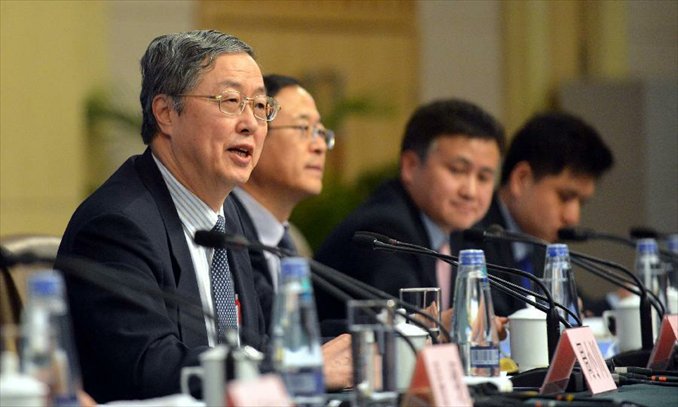Inflation in govt cross hairs

China needs to be on high alert in the face of inflationary pressure, which the central bank will tackle via various means, the head of the country's central bank said Wednesday.
Zhou Xiaochuan, governor of the People's Bank of China (PBC), said during a press conference on the sidelines of the 12th National People's Congress that the bank aims to stabilize consumer prices and inflation by fine-tuning monetary policy and taking other measures.
The warning came after the country released a year-on-year rise of 3.2 percent in its February consumer price index (CPI), the biggest increase since last April.
The governor also said that a prudent monetary policy, which is relatively neutral, would be taken, when being asked of the 13-percent increase target set for this year's broad money supply, or M2, in the government work report delivered by Premier Wen Jiabao.
"This policy needs to draw a balance among its four purposes including lowering inflation, pushing economic growth, promoting employment and keeping a healthy international balance of payments," Zhou said, noting that in most cases, reining in inflation was the top priority.
"For the central bank, stabilizing prices is critical, and economic growth trails behind," Zhou Chunsheng, a professor of finance at the Cheung Kong Graduate School of Business, told the Global Times.
The M2, which covers cash in circulation and all deposits, saw a figure of 97.42 trillion yuan ($15.68 trillion) by the end of 2012, registering a year-on-year increase of 13.8 percent.
The central bank has been highlighting the necessity of stabilizing consumer prices when setting the M2 growth target.
The February CPI figure, which was up from the growth of 2.0 percent registered in January, is usually pushed up by the Spring Festival shopping rush, during which the prices of consumer products rise.
"Only when we control the M2 increase rate within a reasonable range can we avoid a sudden rise in prices," Zhou Xiaochuan said.
He also alleviated concerns by saying that the M2 figures will not necessarily put consumer price stability in jeopardy, thanks to the country's huge share of savings in the national economy and its heavy reliance on indirect financing that supplies capital through bank loans.
"As the country is in its economic transformation, a huge money supply will surely push up the price of capital, especially that of property, despite the many tightening measures," Zhou Chunsheng said.
Yuan Gangming, a professor with the Center for China in the World Economy at Tsinghua University, told the Global Times that February's M2 growth of 15.2 percent is much more suitable. "When it fell to 12 percent in 2011, the economy suffered a slowdown. Every time it falls to a low, the economy suffers."
"There is no inflation, because February's CPI rise is seasonal and temporary. Food prices will drop in March, and pork and vegetable prices have shown these signs," Yuan said.
Experts contacted by the Global Times Wednesday offered varied opinions on whether the country can limit the CPI increase to below the 3.5-percent target set in the government work report.
"The inflation is mild, and it won't be difficult to reach the target, as we predict a 2.8-percent CPI increase," Zhu Jianfang, chief macroeconomic economist at CITIC Securities, told the Global Times.
Zhu also listed other factors that might increase inflation. "Whether train ticket prices increase after the restructuring of the Ministry of Railways and whether gas prices rise due to the higher standards being followed by State-owned petrol refiners still require further observation."
While Zhong Dajun, director of the Beijing Dajun Economy Observer Institute, said there would be mounting inflationary pressure during the first half of this year with a rise of between 3 and 4 percent.
"There has been a resurgence in inflation in recent months after the loosened monetary injection into the market aimed to prop up slowing economic growth that occured last year," Zhong told the Global Times.
Yang Jingjie contributed to this story
